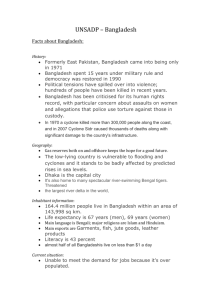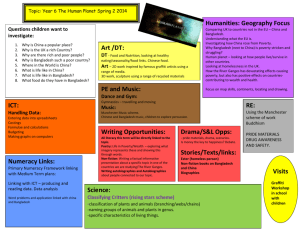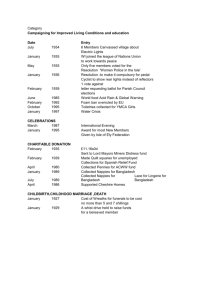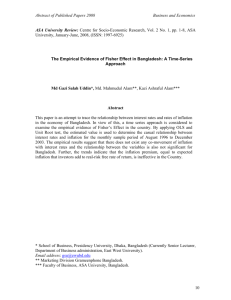human resource development from psychological perspective
advertisement
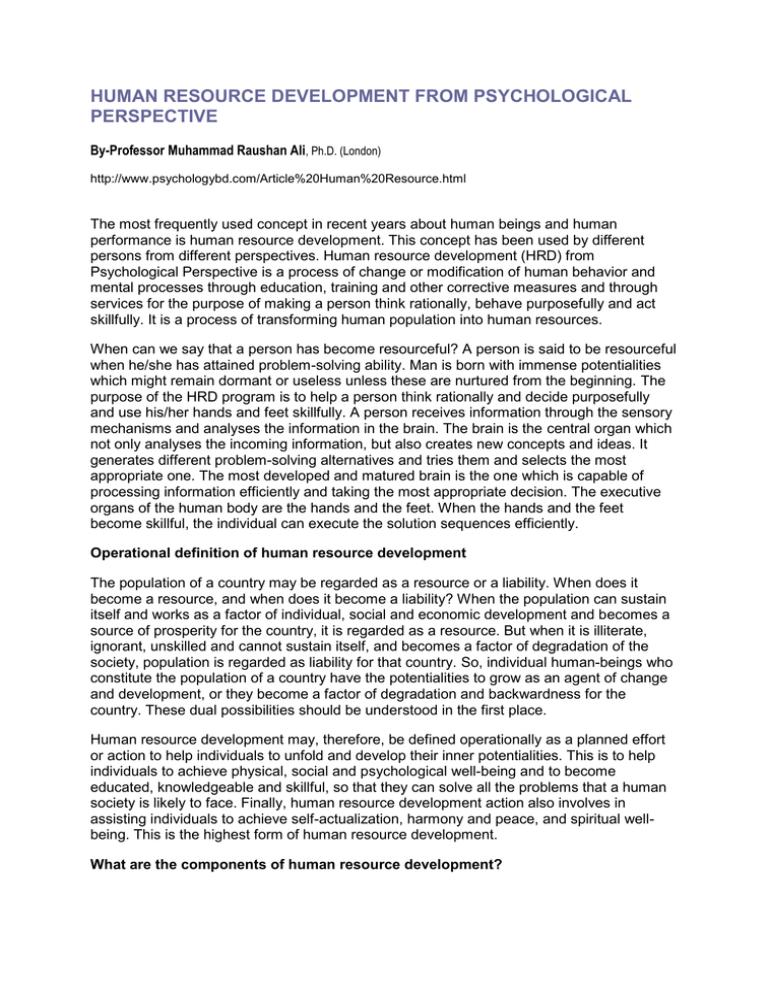
HUMAN RESOURCE DEVELOPMENT FROM PSYCHOLOGICAL PERSPECTIVE By-Professor Muhammad Raushan Ali, Ph.D. (London) http://www.psychologybd.com/Article%20Human%20Resource.html The most frequently used concept in recent years about human beings and human performance is human resource development. This concept has been used by different persons from different perspectives. Human resource development (HRD) from Psychological Perspective is a process of change or modification of human behavior and mental processes through education, training and other corrective measures and through services for the purpose of making a person think rationally, behave purposefully and act skillfully. It is a process of transforming human population into human resources. When can we say that a person has become resourceful? A person is said to be resourceful when he/she has attained problem-solving ability. Man is born with immense potentialities which might remain dormant or useless unless these are nurtured from the beginning. The purpose of the HRD program is to help a person think rationally and decide purposefully and use his/her hands and feet skillfully. A person receives information through the sensory mechanisms and analyses the information in the brain. The brain is the central organ which not only analyses the incoming information, but also creates new concepts and ideas. It generates different problem-solving alternatives and tries them and selects the most appropriate one. The most developed and matured brain is the one which is capable of processing information efficiently and taking the most appropriate decision. The executive organs of the human body are the hands and the feet. When the hands and the feet become skillful, the individual can execute the solution sequences efficiently. Operational definition of human resource development The population of a country may be regarded as a resource or a liability. When does it become a resource, and when does it become a liability? When the population can sustain itself and works as a factor of individual, social and economic development and becomes a source of prosperity for the country, it is regarded as a resource. But when it is illiterate, ignorant, unskilled and cannot sustain itself, and becomes a factor of degradation of the society, population is regarded as liability for that country. So, individual human-beings who constitute the population of a country have the potentialities to grow as an agent of change and development, or they become a factor of degradation and backwardness for the country. These dual possibilities should be understood in the first place. Human resource development may, therefore, be defined operationally as a planned effort or action to help individuals to unfold and develop their inner potentialities. This is to help individuals to achieve physical, social and psychological well-being and to become educated, knowledgeable and skillful, so that they can solve all the problems that a human society is likely to face. Finally, human resource development action also involves in assisting individuals to achieve self-actualization, harmony and peace, and spiritual wellbeing. This is the highest form of human resource development. What are the components of human resource development? There are four integral components of human resource development. These are the physical, psychological, social and spiritual well-being of the individual. These four components arise from different, but integrated, needs of the individual, namely the physical, psychological, social and spiritual needs. The maintenance of a nutritional balance and physical health, treatment during illness and the provision for an adequate shelter and maintaining a healthy social and psychological environment will help develop a well-balanced personality, intelligence and emotional and psychological health of the individual. The spiritual well-being of an individual transcends his physical and psychological wellbeing. Spiritual development of an individual involves in transforming his belief and action system in order to enable him to achieve a universal humanistic attitude, a mental state of loving and seeking for the truth and a longing for the union and harmony with the creator. Through a spiritual development an individual can free himself/herself from the narrow limit of the materialistic outlook and satisfaction. If a proper balance is not achieved among these four components of human needs, human resource development remains incomplete, Human resource development areas: Any human resource development plan should include provisions for the development of all the four components of an individual discussed before. Thus, any action plan for human resource development should include the following programs. 1. Provisions for food, shelter and health. These provisions do not mean that you are to provide these items to everybody. It means that the society must create conditions in which the individuals can earn and pay for these goods and services. 2. Provisions for developing individuals psychologically, emotionally and socially. These would include congenial, healthy and peaceful family, community and social lives where human infants can grow and develop, opportunities for freedom of thought and expression, and a free and unhindered atmosphere where individuals can strive for self-actualization. 3. Provisions for education and training: The best way to develop human population into human resources is to educate and train them so that they can analyze issues critically, take decisions correctly and can perform tasks efficiently. 4. Opportunities for spiritual growth and development: These would include freedom for religious believes and practices without causing injuries to oneself and to others. Human resources development vis-à-vis economic development in Bangladesh Bangladesh has two major problems. These are human resource development problem and human resource management problem. The former involves in making people able physically and psychologically, efficient and skillful, while the latter involves in utilizing them in meaningful productive purposes. If we can achieve these twin objectives, we can reasonably expect to develop our country in all spheres of life. Some experts say that Bangladesh is a poor country, because she has too many mouths to feed but too little resources to utilize. This diagnosis is not correct. A person has only one stomach to feed, but two hands to work with, two feet to walk on and a brain to think and decide upon If a person is healthy and intelligent, and is educated and trained to use his hands and feet skillfully and the brain to think rationally and decide purposefully, he can solve all the problems that a human society is likely to face. If the majority of the people in a country are of this type, that country is bound to develop economically. Moreover, Bangladesh is a resourceful country It is a country with plain, fertile land. It is full of sweet water rivers. She has the potentiality for developing a viable fish cultivation and a fishing industry which alone can sustain a larger section of the population. Bangladesh has forests and natural gas reserves. In spite of all these resources and possibilities, Bangladesh is a poor and underdeveloped country. This is mainly because most of the people are illiterate, unskilled and inefficient. There is only a shortage of knowledge, skill and technological know-how to utilize these resources. So in order to develop Bangladesh economically, her human population must he developed into human resources, Human resources development strategy The development of human beings into human resources involves many factors, four factors were identified for this purpose and were described earlier. However, we consider education and training as the strategically most important factor for the development of human resources, That is why, we should give major emphasis on education and training. Education is a process which unfolds and develops the inner potentialities of a person. It helps a-person in developing the faculty of critical thinking and problem-solving skills. Education is the gate way to knowledge which is light and power. It broadens one's outlook. Education is likely to increase the information-processing capacity of the brain and thereby enhances the decision-making power of the individual, Although learning is involved in both education, and training, there is a difference between the two. Education is more broader and general in scope, \\liereu, training is narrower and specific in scope. The purpose or education is to acquire knowledge and develop general abilities, the purpose of training is to make a person skillful in certain specific area or areas thus, a person may be educated, but may not be skillful in performing certain tasks. For example, an educated person may know the different parts of a motor car engine and the different control systems, but still may not be able to drive the car if he does not have the training to drive a car. Thus, education and training are very close to each other and in many cases are complementary to each other. Through education we acquire knowledge, develop our faculties and broaden our outlook, and through training we gain skill in applying our knowledge in performing certain tasks efficiently. Why should we consider education and training as the strategically important factor in developing human resources in Bangladesh? This is because the best way to develop human beings is to educate and train them in order to make them creative, imaginative, highly motivated and skillful. and to help them develop a congenial work-habit and acquire problem-solving skills. The precious resource of Bangladesh is her people, but the value of this resource is dependent upon the extent to which it is developed through education and training. Education Lo be a vehicle for human resource development must develop not only general abilities but also specific skills that will help graduates in situations they are called for. Education plays an important role In maintaining the fabric of the society and in preparing individuals to make their maximum contributions to the economic development of thecountry. The sole of psychologists in education and training is to apply the principles of learning and motivation, so that the process of education becomes effective, easy and enjoyable. Other psychological strategies of human resource development include manipulation of environment, child rearing practices, exercise of parental authority, and other correctional services.

